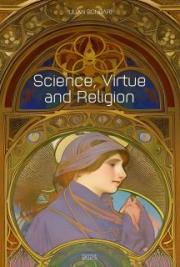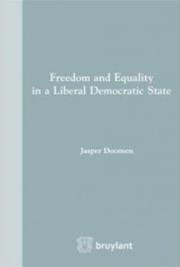Endnotes
[1] “Fragilis et laboriosa mortalitas in partes ista digessit, infirmitatis suæ memor, ut portionibus quisquis coleret, quo maxime indigeret” (Plin. lib. ii. cap. 7). So early as Hesiod’s time there were 30,000 deities (Works and Days, lib. i. ver. 250). But the task to be performed by these seems still too great for their number. The provinces of the deities were so subdivided, that there was even a God of Sneezing (see Aristotle’s Problems, sec. 33, cap. 7). The province of copulation, suitable to the importance and dignity of it, was divided among several deities.
[1] Lib. viii. 33.
[1] The following lines of Euripides are so much to the present purpose, that I cannot forbear quoting them:
Ο κ στιν ο δὲν πιστ ν, ο τ’ ε δοξία
Ο τ α καλ ς πράσσοντα µ πράξειν κακ ς.
Φύρουσι δ’ α θ’ ο θεο πάλιν τε κα πρόσω,
Ταραγµ ν εντιθέντες, ς γνωσί
Σέβωµεν α τούς.
HECUBA, 956.
“There is nothing secure in the world; no glory, no prosperity. The Gods toss all life into confusion; mix everything with its reverse; that all of us, from our ignorance and uncertainty, may pay them the more worship and reverence.”
[1] Diod. Sic., lib. iii. 47.
[1] Lib. vi. 297.
[1] Père le Compte.
[2] Regnard, “Voïage de Laponie”.
[3] Diod. Sic., lib. i. 86. Lucian de Sacrificiis, 14. Ovid alludes to the same tradition, Metam., lib. v. l. 321. So also Manilius, lib. iv. 800.
[4] Herodot., lib. i. 172.
http://oll.libertyfund.org/Texts/Hume0129/HistoryReligion/0211_Bk.html
4/14/2004




Hume, The Natural History of Religion (1757): The Online Library of Liberty Page 50 of 57
[5] Cæs. Comment. de bello Gallico, lib. iv. 7.
[6] Lib. v. 382.
[7] Chap. ix.
[1] Père Brumoy, “Théâtre des Grecs”; and Fontenelle, “Histoire des Oracles”.
[2] Arnob., lib. vii. 507 H.
[3] De Laced. Rep. 13.
[4] Epist. xli.
[1] Quint. Curtius, lib. iv. cap. iii. Diod. Sic., lib. xvii.
[2] Suet. in Vita Aug., cap. xvi.
[3] Id. in Vita Cal., cap. v.
[4] Herodot., lib. ii. Lucian, Jupiter Confutatus, de luctu, Saturn, etc.
[5] ς µόθεν γεγάασι θεο θνητο τ’ νθρωποι. Hesiod, Opera et Dies, l. 108.
[6] Theog. l. 570.
[1] Metamorph. lib. i. l. 32.
[2] Lib. i. 6, et seq.
[3] Id. iii. 20.
[4] The same author, who can thus account for the origin of the world without a Deity, esteems it impious to explain, from physical causes, the common accidents of life, earthquakes, inundations, and tempests; and devoutly ascribes these to the anger of Jupiter or Neptune. A plain proof whence he derived his ideas of religion. See lib. xv. c.
48, p. 364. Ex edit. Rhodomanni.
[1] It will be easy to give a reason why Thales, Anaximander, and those early philosophers, who really were Atheists, might be very orthodox in the pagan creed; and why Anaxagoras and Socrates, though real theists, must naturally, in ancient times, be esteemed impious. The blind, unguided powers of nature, if they could produce men, might also produce such beings as Jupiter and Neptune, who, being the most powerful, intelligent existences in the world, would be proper objects of worship. But where a supreme intelligence, the first cause of all, is admitted, these capricious beings, if they http://oll.libertyfund.org/Texts/Hume0129/HistoryReligion/0211_Bk.html
4/14/2004
Hume, The Natural History of Religion (1757): The Online Library of Liberty Page 51 of 57
exist at all, must appear very subordinate and dependent, and consequently be excluded from the rank of deities. Plato (de leg., lib. x.) assigns this reason for the imputation thrown on Anaxagoras, viz: his denying the divinity of the stars, planets, and other created objects.
[2] Adversus Mathem., lib. ix.
[1] Dionys. Halic. lib. vi. 54.
[2] Epist. lib. vi.
[1] Hesiod, Theog. l. 935.
[2] Id. ibid. and Plut. in vita Pelop. 19.
[1] Iliad, xiv. 267.
[1] Herodian, lib. v. 3, 10. Jupiter Ammon is represented by Curtius as a deity of the same kind, lib. iv., cap. 7. The Arabians and Pessinuntians adored also shapeless unformed stones as their deity. Arnob. lib. vi. 496 A. So much did their folly exceed that of the Egyptians.
[2] Diog. Laert., lib. ii. 116.
[1] See Cæsar, of the religion of the Gauls, De bello Gallico, lib. vi. 17.
[2] De moribus Germ. 40.
[1] Histoire Abrégée, p. 499.
[1] Hyde de Relig. veterum Persarum.
[2] Called the Scapulaire.
[1] Lib. iv. c. 94.
[1] Verrius Flaccus, cited by Pliny, lib. xxviii, cap. 2, affirmed that it was usual for the Romans, before they laid siege to any town, to invocate the tutelar deity of the place, and by promising him equal or greater honors than those he at present enjoyed, bribe him to betray his old friends and votaries. The name of the tutelar deity of Rome was for this reason kept a most religious mystery; lest the enemies of the republic should be able, in the same manner, to draw him over to their service. For without the name, they thought, nothing of that kind could be practised. Pliny says that the common form of invocation was preserved to his time in the ritual of the pontiffs. And Macrobius has http://oll.libertyfund.org/Texts/Hume0129/HistoryReligion/0211_Bk.html
4/14/2004
Hume, The Natural History of Religion (1757): The Online Library of Liberty Page 52 of 57
transmitted a copy of it from the secret things of Sammonicus Serenus.
[1] Xenoph. Memor. lib. i, 3, 1.
[1] Plutarch, de Isid. et Osiride. c. 72.
[2] Lib. ii. c. 180.
[3] Hyde de Relig. vet. Persarum.
[4] Arrian, de Exped. lib. iii, 16. Id. lib. vii, 17.
[5] Id. ibid.
[1] Sueton. in vita Aug. cap. 93.
[2] Corruptio optimi pessima.
[3] Most nations have fallen into this guilt of human sacrifices; though, perhaps, that impious superstition has never prevailed very much in any civilised nation, unless we except the Carthaginians. For the Tyrians soon abolished it. A sacrifice is conceived as a present; and any present is delivered to the deity by destroying it and rendering it useless to men; by burning what is solid, pouring out the liquid, and killing the animate.
For want of a better way of doing him service, we do ourselves an injury; and fancy that we thereby express, at least, the heartiness of our good-will and adoration. Thus our mercenary devotion deceives ourselves, and imagines it deceives the deity.
[1] Strabo, lib. v, 239. Sueton. in vita Cal. 35.
[1] Arrian, passim.
[2] Thucyd. lib. v, 11.
[3] Discorsi, lib. vi.
[4] Plut. Apophth.
[1] Bayle, Article Bellarmine.
[1] Lib. iii, cap. 38.
[1] It is strange that the Egyptian religion, though so absurd, should yet have borne so great a resemblance to the Jewish, that ancient writers even of the greatest genius were not able to observe any difference between them. For it is remarkable that both Tacitus and Suetonius, when they mention that decree of the senate, under Tiberius, by http://oll.libertyfund.org/Texts/Hume0129/HistoryReligion/0211_Bk.html
4/14/2004
Hume, The Natural History of Religion (1757): The Online Library of Liberty Page 53 of 57
which the Egyptian and Jewish proselytes were banished from Rome, expressly treat these religions as the same; and it appears that even the decree itself was founded on that supposition. “Actum et de sacris Ægyptiis Judaicisque pellendis; factumque patrum consultum, ut quatuor millia libertini generis ea superstitione infecta, quis idonea ætas, in insulam Sardiniam veherentur, coercendis illic latrociniis; et si ob gravitatem cœli interissent, vile damnum: Ceteri cederent Italia, nisi certam ante diem profanos ritus exuissent” (Tacit. Ann. lib. ii. cap. 85). “Externas cæremonias, Ægyptios, Judaicosque ritus compescuit; coactus qui superstitione ea tenebantur, religiosas vestes cum instrumento omni comburere, etc.” (Sueton. Tiber., cap. 36). These wise heathens, observing something in the general air and genius and spirit of the two religions to be the same, esteemed the differences of their dogmas too frivolous to deserve any attention.
[2] Lib. i, 83.
[1] When Louis XIV. took on himself the protection of the Jesuits’ college of Clermont, the society ordered the king’s arms to be put up over the gate, and took down the cross, in order to make way for it. Which gave occasion to the following epigram: Sustulit hino Christi, posuitque insignia Regis:
Impia gens, alium nescit habere Deum.
[2] De Nat. Deor. i, 29.
[3] Tusc. Quæst, lib. v, 27.
[1] De Civitate Dei, l. iii., cap. 17.
[1] Claudii Rutilii Numitiani iter, lib. i. 1. 394.
[2] In vita Adriani. 14.
[3] Lib. xiv. epist. 7.
[4] Cicero de Divin. lib. ii., cap. 24.
[1] Suston Aug. cap. 90, 91, 92. Plin. lib. ii., cap. 7. (5.)
[1] Witness this remarkable passage of Tacitus: “Præter multiplices rerum humanarum casus, cœlo terraque prodigia, et fulminum monitus, et futurorum præsagia, læta, tristia, ambigua, manifesta. Neo enim unquam atrocioribus populi Romani cladibus, magisque justis indiciis approbatum est, non esse curæ Diis securitatem nostram, esse ultionem” (Hist. lib. i, 3). Augustus’s quarrel with Neptune is an instance of the same http://oll.libertyfund.org/Texts/Hume0129/HistoryReligion/0211_Bk.html
4/14/2004
Hume, The Natural History of Religion (1757): The Online Library of Liberty Page 54 of 57
kind. Had not the emperor believed Neptune to be a real being, and to have dominion over the sea, where had been the foundation of his anger? And if he believed it, what madness to provoke still farther that deity? The same observation may be made upon Quinctilian’s exclamation on account of the death of his children, lib. vi. Præf.
[2] Philopseudes 3.
[3] Lib. x. cap. 40.
[1] Cicero de Divin. lib i., cap. 3 and 7.
[2] Lib. i. § 17.
[3] Ench. § 17.
[4] The Stoics, I own, were not quite orthodox in the established religion; but one may see, from these instances, that they went a great way; and the people undoubtedly went every length.
[5] Eutyphro. 6.
[6] Phædo.
[1] Xenophon’s conduct, as related by himself, is at once an incontestable proof of the general credulity of mankind in those ages, and the incoherences, in all ages, of men’s opinions in religious matters. That great captain and philosopher, the disciple of Socrates, and one who has delivered some of the most refined sentiments with regard to a deity, gave all the following marks of vulgar, pagan superstition. By Socrates’
advice, he consulted the oracle of Delphi, before he would engage in the expedition of Cyrus. De Exped. lib. iii. p. 294. ex edit. Leuncl. Sees a dream the night after the generals were seized; which he pays great regard to, but thinks ambiguous. Id. p. 295.
He and the whole army regard sneezing as a very lucky omen. Id. p. 300. Has another dream, when he comes to the river Centrites, which his fellow-general, Cherosophus, also pays great regard to. Id. lib. iv., page 323. The Greeks, suffering from a cold north wind, sacrifice to it; and the historian observes that it immediately abated. Id. p. 329.
Xenophon consults the sacrifices in secret, before he would form any resolution with himself about settling a colony. Lib. v. p. 359. He was himself a very skilful augur. Id. p 361. Is determined by the victims to refuse the sole command of the army which was offered him. Lib. vi. p. 273. Cleander, the Spartan, though very desirous of it, refuses it for the same reason. Id. p. 392. Xenophon mentions an old dream with the
interpretation given him, when he first joined Cyrus. P. 373. Mentions also the place of Heroules’ descent into hell as believing it, and says the marks of it are still remaining.
Id. p. 375. Had almost starved the army, rather than lead them to the field against the suspices. Id. p. 382, 383. His friend, Euclides, the augur, would not believe that he had http://oll.libertyfund.org/Texts/Hume0129/HistoryReligion/0211_Bk.html
4/14/2004
Hume, The Natural History of Religion (1757): The Online Library of Liberty Page 55 of 57
brought no money from the expedition till he (Euolides) sacrificed, and then he saw the matter clearly in the Exta. Lib. vii. p. 425. The same philosopher, proposing a project of mines for the increase of the Athenian revenues, advises them first to consult the oracle. De Rat. Red. p. 392. That all this devotion was not a farce, in order to serve a political purpose, appears both from the facts themselves, and from the genius of that age, when little or nothing could be gained by hypocrisy. Besides, Xenophon, as appears from his Memorabilia, was a kind of heretic in those times, which no political devotee ever is. It is for the same reason I maintain that Newton, Locke, Clarke, etc., being Arians or Socinians, were very sincere in the creed they professed. And I always oppose this argument to some libertines, who will needs have it that it was impossible but that these great philosophers must have been hypocrites.
[1] Pro Cluentio, cap. 61.
[2] De bello Catilin. 51.
[3] Cicero (Tusc. Quæst. lib. i. cap. 5, 6,) and Seneca (Epist. 24), as also Juvenal (Satyr 2, 149), maintain that there is no boy or old woman so ridiculous as to believe the poets in their accounts of a future state. Why then does Lucretius so highly exalt his master for freeing us from these terrors? Perhaps the generality of mankind were then in the disposition of Cephalus in Plato (de Rep. lib. i 330 D.), who while he was young and healthful could ridicule these stories, but as soon as he became old and infirm began to entertain apprehensions of their truth. This we may observe not to be unusual even at present.
[4] Sext. Empir. advers. Mathem. lib. ix, 429.
[1] Mem. lib. i, 19.
[2] It was considered among the ancients as a very extraordinary philosophical paradox that the presence of the Gods was not confined to the heavens, but was extended everywhere; as we learn from Lucian, Hermotimus sive De sectis 81.
[1] Plutarch. de Superstit., 10.
[1] Necyomantia 3.
[2] Bacchus, a divine being, is represented by the heathen mythology as the inventor of dancing and the theatre. Plays were anciently even a part of public worship on the most solemn occasions, and often employed in times of pestilence to appease the offended deities. But they have been zealously proscribed by the godly in later ages; and the playhouse, according to a learned divine, is the porch of hell. But in order to show more evidently that it is possible for a religion to represent the divinity in still a more immoral and unamiable light than he was pictured by the ancients, we shall cite a http://oll.libertyfund.org/Texts/Hume0129/HistoryReligion/0211_Bk.html
4/14/2004
Hume, The Natural History of Religion (1757): The Online Library of Liberty Page 56 of 57
long passage from an author of taste and imagination, who was surely no enemy to Christianity. It is the Chevalier Ramsay, a writer who had so laudable an inclination to be orthodox, that his reason never found any difficulty even in the doctrines which Freethinkers scruple the most, the trinity, incarnation, and satisfaction. His humanity alone, of which he seems to have had a great stock, rebelled against the doctrines of eternal reprobation and predestination. He expresses himself thus: “What strange ideas,” says he, “would an Indian or a Chinese philosopher have of our holy religion, if they judged by the schemes given of it by our modern Freethinkers, and pharisaical doctors of all sects? According to the odious and too vulgar system of these incredulous scoffers and credulous scribblers, ‘The God of the Jews is a most cruel, unjust, partial, and fantastical being. He created, about 6,000 years ago, a man and a woman, and placed them in a fine garden of Asia, of which there are no remains. This garden was furnished with all sorts of trees, fountains and flowers. He allowed them the use of all the fruits of this beautiful garden, except of one, that was planted in the midst thereof, and that had in it a secret virtue of preserving them in continual health and vigour of body and mind, of exalting their natural powers and making them wise. The devil entered into the body of a serpent, and solicited the first woman to eat of the forbidden fruit; she engaged her husband to do the same. To punish this slight curiosity and natural desire of life and knowledge, God not only threw our first parents out of paradise, but he condemned all their posterity to temporal misery, and the greatest part of them to eternal pains, though the souls of these innocent children have no more relation to that of Adam than to those of Nero and Mahomet; since, according to the scholastic drivellers, fabulists, and mythologists, all souls are created pure, and infused immediately into mortal bodies, so soon as the fœtus is formed. To accomplish the barbarous, partial decree of predestination and reprobation, God abandoned all nations to darkness, idolatry, and superstition, without any saving knowledge or salutary graces; unless it was one particular nation, whom he chose as his peculiar people. This chosen nation was, however, the most stupid, ungrateful, rebellious and perfidious of all nations. After God had thus kept the far greater part of all the human species, during near 4,000 years, in a reprobate state, he changed all of a sudden, and took a fancy for other nations, beside the Jews. Then he sent his only begotten son to the world, under a human form, to appease his wrath, satisfy his vindictive justice, and die for the pardon of sin. Very few nations, however, have heard of this gospel; and all the rest, though left in invincible ignorance, are damned without exception, or any possibility of remission. The greatest part of those who have heard of it have changed only some speculative notions about God, and some external forms in worship. For in other respects the bulk of Christians have continued as corrupt as the rest of mankind in their morals; yea, so much the more perverse and criminal, that their lights were greater.
Unless it be a very small, select number, all other Christians, like the pagans, will be for ever damned; the great sacrifice offered up for them will become void and of no effect; God will take delight for ever in their torments and blasphemies; and though he can by one fiat change their hearts, yet they will remain for ever unconverted and unconvertible, because he will be for ever unappeasable and irreconcilable. It is true http://oll.libertyfund.org/Texts/Hume0129/HistoryReligion/0211_Bk.html
4/14/2004
Hume, The Natural History of Religion (1757): The Online Library of Liberty Page 57 of 57
that all this makes God odious; a hater of souls, rather than a lover of them; a cruel, vindictive tyrant; an impotent or a wrathful dæmon, rather than an all-powerful, beneficent father of spirits. Yet all this is a mystery. He has secret reasons for his conduct that are impenetrable; and though he appears unjust and barbarous, yet we must believe the contrary, because what is injustice, crime, cruelty, and the blackest malice in us, is in him justice, mercy, and sovereign goodness.’ Thus the incredulous Freethinkers, the judaizing Christians, and the fatalistic doctors have disfigured and dishonored the sublime mysteries of our holy faith; thus they have confounded the nature of good and evil, transformed the most monstrous passions into divine attributes, and surpassed the pagans in blasphemy, by ascribing to the eternal nature, as perfections, what makes the most horrid crimes amongst men. The grosser pagans contented themselves with divinizing lust, incest, and adultery; but the predestinarian doctors have divinized cruelty, wrath, fury, vengeance, and all the blackest vices.” (See the Chevalier Ramsay’s “Philosophical Principles of Natural and Revealed Religion”, part 2, p. 401.) The same author asserts, in other places, that the Arminian and Molinist schemes serve very little to mend the matter. And having thus thrown himself out of all received sects of Christianity, he is obliged to advance a system of his own, which is a kind of Origenism, and supposes the pre-existence of the souls both of men and beasts, and the eternal salvation and conversion of all men, beasts, and devils. But this notion, being quite peculiar to himself, we need not treat of. I thought the opinions of this ingenious author very curious; but I pretend not to warrant the justness of them.
[3] Ovid. Metam. lib. ix. 499.
[1] Called Dictator clavis figendæ causa. T. Livii, l. vii., cap. 2.
[1] Lib. vi. 91.
[2] To be found in Diod. Sic. lib. xii. 120.
[1] Diod. Sic. lib. xx. 43.
[2] Cic. Catil. i. 6. Salust, de Bello Catil, 22.
http://oll.libertyfund.org/Texts/Hume0129/HistoryReligion/0211_Bk.html
4/14/2004











